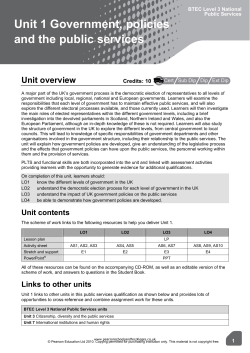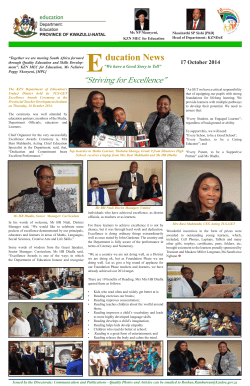
Editor’s note
NEWSLETTER Quarterly Newsletter October 2014 Editor’s note Ms Lavhelesani Mainganye Public Service month serves to ensure that service levels are on the rise. 1-30 September marks the Public Service Month (PSM) in our country. PSM is an integrated strategic national event in the calendar of the Public Service and Administration, as such In this issue: informing unemployed learners of the learning opportunities available in the public sector. In this issue we report on a number of success stories which include; the role of PSETA in the skills for and through Strategic Integrated Projects (SIPs); learning programmes running in the Eastern Cape province; the appointment of our CEO to serve in provincial HRDCs; learner graduations in KZN and the frequently asked questions regarding the utilisation of the 1% levy. We trust that you will find this edition informative. CEO’s desk—Skills for and through Strategic Integrated Projects (SIPs) Skills for and through Strategic Integrated Projects 1 PSETA making inroads in the Eastern Cape Province 2 Levy contribution to the PSETA 3 Limpopo & Free State HRDC has a new member all the national and provincial departments are required to participate and thereby put in place activities and campaigns to take service delivery to a higher productivity level. As PSETA in support of this initiative we intensified our stakeholder engagement through a variety of interventions including , workshops aimed at imparting important information with the employers to address skills development issues across government departments. The organisation also participated in a number of career exhibitions Ms Shamira Huluman 3 Utilisation of the 1% levy Questions & Answers 3 KZN learners graduations july 2014 4 Upcoming Events: 2013/2014 Annual General Meeting 27 November 2014 @ Burgers Park Hotel, Pretoria RSVP: SuzanMa@pseta.org.za by 15 November 2014 The South African government has adopted the National Development Plan (NDP) in November 2011 as its framework for addressing the key ills in the country namely, high unemployment, high inequality and high levels of poverty. In the following year the President announced the commencement of the National Infrastructure Plan emphasising that the country be industrialised, skills generated boost much needed job creation. To date the Department of Higher Education & Training have been working tirelessly to ensure that skills are indeed generated both for the infrastructure projects as well as through them. Progress made to date include establishing what skills are needed for the infrastructure projects, known as the Strategic Integrated Projects or SIPs. Occupational Teams consisting of people who are deeply familiar with the occupations in question were established. Of the recommendations made by the team, SETAs have a significant role to play in the implementation of these projects. PSETA will be funding 235 SIPs related occupations namely Programme Managers, Assistant Programme Managers and Project administrators. Competency requirements for project and programme managers include technical knowledge on the delivery of projects, programmes or portfolios, an understanding on the integration of work across disciplines, the production of deliverables and an understanding of the phases through which projects should progress. The occupations are linked to one of the priority skills for the public service sector. The priority skills for the public service sector are (1) Management, (2) Supply Chain Management, (3) Human Resource Management & Development, and (4) E-learming. Consequently, it is imperative that the structures, policies and operations of the public service respond adequately to the overall direction the State is adopting to enhance its economic and national development. Developing management capacity requires more than attendance at one or two short courses. The notion that any manager can manage anything has resulted in the demise of many businesses and structures. In terms of achieving the National Development Plan’s objective of building a capable state, management in the public sector must be strengthened. Not only are senior managers often inadequately skilled or experienced , but large numbers of management posts are vacant. The development of management capacity in the SIPs plan relates to management within the public sector. It is evident that, without the ability to plan and manage the rollout of projects by the public sector, the end result of the SIPs will not be achieved. Source: Skills for and through SIPs report PSETA NEWSLETTER PAGE 2 Our Vision Cutting Edge Skills for Quality Public Services Our Values Honesty & Integrity Accountability Service Excellence Fairness & Transparency Front Row Sonwabiso Ngwadla from KSD FET College and 3 learner mentors from the Lusikisiki Magistrates courts with the seven learners in the back row Our Mission Leading in the development of skilled and competent human capital in the public service sector through: Effective coordination of skills development interventions based on occupa- tionally directed qualifications; Focusing on learning PSETA making inroads in the Eastern Cape Province By Ncumisa Khumalo– Learning Programmes Specialist PSETA Learning Programmes Department started the 2014/15 Skills Development Year on a high note with the signing of a Memorandum of Agreement with the Eastern Cape Department of Transport for the training of 26 artisan learners and 13 Work Integrated Learners. PSETA has set aside just over R2 million for this project which kicked off mid July 2014 with the recruitment and placement of the 39 beneficiaries sourced from FET Colleges in the province. programmes and Promoting learner placement and absorption within the public service sector With this initiative PSETA seeks to affirm its position as the lead SETA in the Transversal Skills Space – those skills that are unique to government and also to strengthen partnerships with the FET Colleges in this province. In line with its mandate of opening up the public service as a training space, PSETA has also partnered with the Eastern Cape Department of Justice and the KSD FET College for the placement of 7 FET College learners for Work Integrated Learning. The learners in this project started in April 2014. The primary purpose of the Learning Programmes department of the PSETA is to facilitate the development of learning programmes that address specific sectoral needs as identified in the Sector Skill Plan (SSP), the department also advise government departments on the implementation of the indicated learning programmes as well as to do the monitoring and evaluation thereof. The Eastern Cape success story is one of the great work done across the public service sector in implementing learning programmes in the sector as well as opening up the public service sector into a training space. Government is expected to make opportunities available for apprenticeships, learnerships, internships (including student interns) at national, provincial and municipal levels. It is essential that the public service sector is opened up as a training space to the greatest extent possible not only to meet the very significant skills needs of government but also to ensure that government plays its role in addressing national skills shortages. For more information regarding implementation of Learning Programmes in the public service sector contact : Ms Ncumisa Khumalo Learning Programmes Specialist Tel: 012 423 5702 Email: NcumisaK@pseta.org.za Working together achieve more! we can PSETA NEWSLETTER Levy contribution to the PSETA F/Y 2014/2015 In terms of the DPSA Directive, a contribution of 30% of the 1% of total department’s annual personnel budget for training and development of its personnel and potential employees is to be paid over to the line function SETA and to PSETA. The contribution of the 30% portion shall be payable to the SETA quarterly and no later than the last day of the first month of each quarter. It is the responsibility of your department to submit a written request to the relevant Treasury seeking and motivating for the creation of transfers to the PSETA in line with Treasury Regulation 6.3.1(a) and (b). The account details to which transfers may be made is as follows: The Public Service Sector Education & Training Authority; ABSA Bank; Account Number: 40-5196-0384; Current Account; Branch Name: RBB Commercial Northern Region; Branch Code: 632005. Gratitude to all the Departments who have started making the transfers to PSETA. PAGE 3 Limpopo & Free State provincial human resource development council has a new member “Interventions in human resource devel- opment represent an essential contribution to promoting the country’s development agenda. The need to develop and implement a robust HRD strategy is as important today as it was at the onset of our democracy in 1994.” HRDSA Congratulations are in order to the CEO, Ms Shamira Huluman on her nomination to serve in the Human Resources Development Council (HRDC) for Limpopo and Free State provinces. The Human Resource Development Council of South Africa (HRDCSA) encourages provinces to form their own HRD Provincial Councils in the Premiers’ offices in view of the fact that all provinces have their own unique human resource issues in addition to those that they share. The aim of Provincial Council is to identify and unlock bottlenecks in skills development in order to support economic growth of the provinces and the country at large. The goals of the provincial councils are; to lead and support the implementation of government human resources initiatives to improving human resource in the provinces and the country at large; to urgently and substantively reduce the scourges of poverty, inequality and unemployment in South Africa; to promote justice and social cohesion through improved equity in the provision and outcomes of education and skills development programmes; and to substantively improve national economic growth and development through the improved competitiveness of the South African economy. In her acceptance to serve in both councils the CEO cited “I am looking forward to meaningful engagements and participation in the council in our quest to improve skills development in the provinces and the country”. Utilisation of the 1% levy Frequently Asked Questions Question: What is the 1% levy and what purpose does it serve? Answer: It is a portion of the personnel budget for training and development that is paid to SETAs by employers. It is meant to ensure employees have ongoing and equitable access to training interventions identified in the Sector Skills Plan. Question: Who should pay the 1% levy? Answer: In terms of Skills Development Act all employers with over 50 employees pay the levy. Question: Does the entire 1% get paid to PSETA? Answer: Of the 1% only 30% is paid to a SETA with which the employer is affiliated and 70% of the 1% will remain with the employer. 20% shall be set aside for unemployed youth training and the other 50% will be utilised for current employees. Question: How is the transfer to PSETA created? Answer: Government departments must apply to their relevant Treasury for the creation of transfer payments to PSETA in 2014/2015. The creation of transfers to PSETA must take place in accordance with the PFMA, 1999 as amended. Increase of transfers to an entity has to be applied for by the accounting officer of the department to National Treasury. Question: Are all employers compelled to pay the levy? Answer: Yes. Per annum each government department shall set aside a minimum of one percent (1%) of the total annual personnel budget for training and development of its personnel and potential employees Question: How will I know if the transfer is successful? Answer: The creation of transfers is approved by Treasury and accounting officers will be notified accordingly. PSETA will therefore circulate to all departments a list with names of departments and amounts that each department is expected to transfer to PSETA. Question: How does an employee benefit from the 1%? Answer: SETAs fund discretionary projects, as applied for by the respective employer, which include bursaries, learnerships, skills programmes and occupational qualifications Question: What happens if an employer fails to pay the levy? Answer: All employers are obligated to contribute the levies in terms of the directive of the DPSA No1 of 2013 and the National Treasury Circular issued on 9th July 2014. Question: What is the exact amount that should be transferred to PSETA? Answer: DPSA in the HRD Circular 1 of 2013 has worked out a formula for the calculation of levies to the line function SETA and to PSETA Question: How often should the transfer to PSETA be made? Answer: Monthly and Quarterly Question: How would departments know into which account to transfer the money to PSETA? Answer: Departments must consult PSETA through the office of the CFO and relevant documents will be made available to departments. Question: Should PSETA invoice or send invoices to Departments? Answer: No this is a transfer payment in terms of the cabinet decision and Ministerial Directive Question: Must departments only wait for the creation of transfer by Treasury before transfer? Answer: No. Departments may send BAS forms to the PSETA to complete for them to capture the details. Subsequent, to that payments may be made. Question: Who do I contact should I need clarity regarding transfer of levies to PSETA? Answer: Finance Manager or CFO on office number 012 423 5733 or email levycollections@pseta.org.za PSETA NEWSLETTER PAGE 4 KZN learners graduations July 2014 The PSETA in partnership with the Office of the Premier in Kwazulu-Natal launched the Rural Youth Skills Development Project. The 25th July 2014 marked a ceremonial recognition of those learners who worked hard to complete their qualifications as well as to change their livelihoods to a better one through education. Kwazulu Natal Premier Mr Senzo Mchunu Speaking at the ceremony Kwazulu Natal Premier Mr Senzo Mchunu, stated that “government working together with other Public and Private entities is trying its best to bridge the skills gap especially in rural areas. Therefore government has collaborated with local municipalities to implement this Rural Youth Skills Development Project (RYSDP) which focuses on the acquisition of skills by young people living in rural areas”. A total of 20 learners have qualified in Public Finance Management and Administration. A further 43 unemployed graduates have been exposed to the workplace through internships in various public institutions and private companies between the period 2012 and 2013 with 13 of these learners securing permanent employment. While other learners are completing, about 25 youth from Msinga and Nkandla have been enrolled as apprentices to qualify as artisans, with 15 apprentices in Motor Mechanics and 10 apprentices in Welding. They are expected to undergo trade testing in 2015. In addition, 20 young stars from Nkandla enrolled in Public Administration expected to complete in 2015. These programmes are aimed to train, develop and empower young South Africans in order to grow our economy towards a better life for all. The PSETA CEO Ms Shamira Huluman flanked by the graduates in Msinga, Kwazulu-Natal PSETA NEWSLETTER PAGE 5 67 minutes of career advice at the Nelson Mandela day career festival “Young people must take it upon themselves to ensure that they receive the highest education possible so that they can represent us well as future leaders” Nelson Mandela On the 18th July 2014 a collaborative event with the Department of Higher Education & Training, SETAs and Gauteng provincial government was held at Sedibeng TVET , Sebokeng Campus to commemorate Nelson Mandela Day . The collaborative event is an annual event that is aimed at offering career information, guidance and advice to learners in secondary school. The event take place for four consecutive days with the minister and selected heads of SETAs offering their 67 minutes of career advice to a group of learners. At this year’s event the PSETA Accounting Authority Chairperson and CEO contributed their 67 minutes offering career information to a group of grade 11 learners. The focus was on careers and learning opportunity across the public service sector. It was an interactive session between the learners and the PSETA principals . A vibrant audience as they asked questions were they did not understand. PSETA CEO Ms Shamira Huluman contributing her 67 minutes The festival was launched in honour of Madiba at Letaba TVET College, Giyani, Limpopo in 2010. To date the Festival has been held in various provinces which include Lusikisiki, Eastern Cape in 2011; Taung, North West in 2012; and Welkom, Free State in 2013. PSETA Accounting Authority Chairperson Ms Koko Mashigo contributing her 67 minutes at the Nelson Mandela Career Festival 353 Festival Street Hatfield, Pretoria, 0028 Telephone: 012 423 5700 Fax: 012 423 5755 E-mail: Communications@pseta.org.za Growing and Developing People www.pseta.org.za
© Copyright 2025










